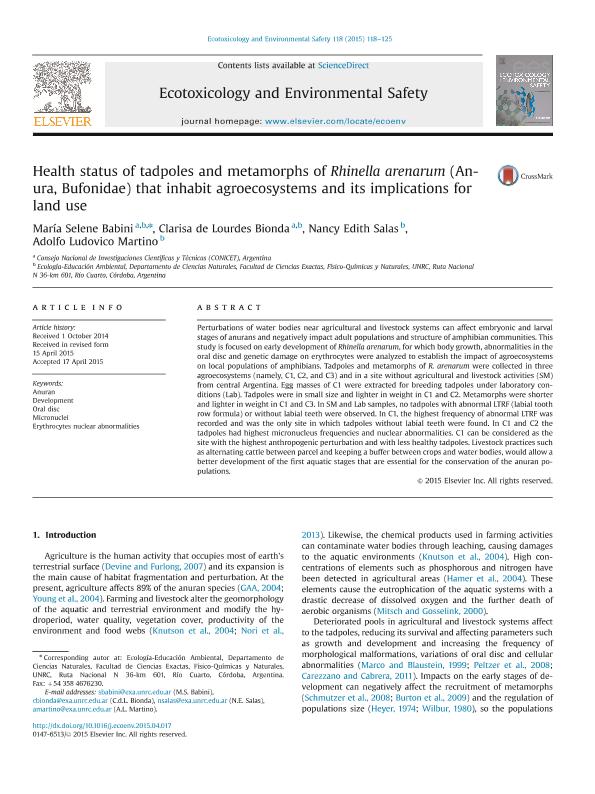Artículo
Health status of tadpoles and metamorphs of Rhinella arenarum (Anura, Bufonidae) that inhabit agroecosystems and its implications for land use
Fecha de publicación:
04/2015
Editorial:
Academic Press Inc Elsevier Science
Revista:
Ecotoxicology and Environmental Safety
ISSN:
0147-6513
Idioma:
Inglés
Tipo de recurso:
Artículo publicado
Clasificación temática:
Resumen
Perturbations of water bodies near agricultural and livestock systems can affect embryonic and larval stages of anurans and negatively impact adult populations and structure of amphibian communities. This study is focused on early development of Rhinella arenarum, for which body growth, abnormalities in the oral disc and genetic damage on erythrocytes were analyzed to establish the impact of agroecosystems on local populations of amphibians. Tadpoles and metamorphs of R. arenarum were collected in three agroecosystems (namely, C1, C2, and C3) and in a site without agricultural and livestock activities (SM) from central Argentina. Egg masses of C1 were extracted for breeding tadpoles under laboratory conditions (Lab). Tadpoles were in small size and lighter in weight in C1 and C2. Metamorphs were shorter and lighter in weight in C1 and C3. In SM and Lab samples, no tadpoles with abnormal LTRF (labial tooth row formula) or without labial teeth were observed. In C1, the highest frequency of abnormal LTRF was recorded and was the only site in which tadpoles without labial teeth were found. In C1 and C2 the tadpoles had highest micronucleus frequencies and nuclear abnormalities. C1 can be considered as the site with the highest anthropogenic perturbation and with less healthy tadpoles. Livestock practices such as alternating cattle between parcel and keeping a buffer between crops and water bodies, would allow a better development of the first aquatic stages that are essential for the conservation of the anuran populations.
Palabras clave:
Anuran
,
Development
,
Erythrocytes Nuclear Abnormalities
,
Micronuclei
,
Oral Disc
Archivos asociados
Licencia
Identificadores
Colecciones
Articulos(CCT - CORDOBA)
Articulos de CTRO.CIENTIFICO TECNOL.CONICET - CORDOBA
Articulos de CTRO.CIENTIFICO TECNOL.CONICET - CORDOBA
Citación
Babini, María Selene; Bionda, Clarisa de Lourdes; Salas, Nancy Edith; Martino, Adolfo Ludovico; Health status of tadpoles and metamorphs of Rhinella arenarum (Anura, Bufonidae) that inhabit agroecosystems and its implications for land use; Academic Press Inc Elsevier Science; Ecotoxicology and Environmental Safety; 118; 4-2015; 118-125
Compartir
Altmétricas




